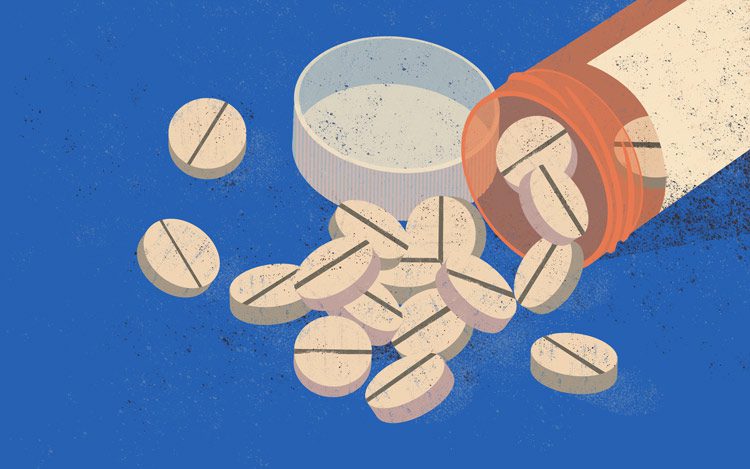It all starts innocently enough. You go to the doctor because you are feeling sick or having a hard time concentrating or feeling sad all of the time or experiencing chronic pain. Your doctor listens to you, makes a diagnosis, talks you through some treatment options, and prescribes some medication to help alleviate your symptoms.
So far, so good.
But for some, things take a terrible turn for the worse. Prescription drug abuse is on the rise. Those who become addicted to their prescriptions can find their lives falling apart. Or they may lose their lives altogether.
Because of this, it is important to remain vigilant when you or a loved one is taking prescription medication. Knowing the signs and symptoms of addiction to prescription drugs can help. The prescription drugs that are most commonly misused can be divided into three categories: opioids, depressants, and stimulants. We’ll consider each below.
The Opioid Crisis Is Ongoing
Drugs like OxyContin and Codeine that are prescribed to help with moderate to severe pain fall under the category of opioids. These drugs have been in the news frequently in recent years as more and more people have developed an addiction to them. On the one hand, these drugs are extremely effective at helping people manage pain; on the other hand, they are highly addictive. As a result, they must be prescribed and used with great care.
Signs of misuse of opioids include:
- Drowsiness or lethargy
- Dizziness or confusion
- Feelings of euphoria
- Changes in vision
Headaches - Nausea and vomiting
- Constipation
- Seizures
- Difficulty breathing
- Marked changes in behavior or personality
Potential Dangers of Depressants
Drugs like Xanax or Valium that are prescribed to treat anxiety disorders fall under the category of depressants. Ideally, these drugs would be part of a larger strategy for helping a person reduce feelings of panic and anxiety in their lives. But for some, the quick relief that comes from taking the medication can lead to misuse. This may be particularly true for those whose lives are inherently stressful due to their high pressure job, their difficult relationships, or other situations. Unfortunately, a quick fix can quickly become a long-term prescription drug abuse problem.
Signs of misuse of depressants are very similar to the signs of misuse of opioids listed above.
Straight Talk About Stimulants
Drugs like Adderall or Ritalin that are frequently used to treat Attention Deficit Hyperactivity Disorder (commonly known as ADHD) fall under the category of stimulants. These drugs can be very beneficial for ameliorating the symptoms of ADHD, but they are frequently misused by those looking for a way to stay focused and awake for extended periods of time. Stimulants often appeal to college students or those in jobs that require high performance for extended periods of time. The benefits, however, are not worth the cost to a person’s health over time.
Signs of misuse of stimulants include:
- Feelings of euphoria
- Rapid heart rate
- Hallucinations or paranoia
- Hostility or aggressiveness
- Reduced appetite or weight loss
- Dilated pupils or changes in vision
- Headaches
- Nausea and vomiting
- Marked changes in behavior or personality
The Path from Misuse to Substance Use Disorder
All of the prescription drug abuse signs we’ve noted above are reason for concern and should be addressed. If they aren’t, a substance use disorder could develop.
Signs that the misuse of a prescription drug has become something worse include:
- Intense urges to take the prescription drug that are difficult to quell
- Requiring more of the prescription drug to gain the same level of relief
- Stockpiling or going to extremes to acquire the prescription drug—including doctor shopping
- Significant changes in sleeping or eating habits
- Loss of interest in activities a person previously enjoyed
- The avoidance of social situations
- Marked changes in personality, appearance, or hygiene
- Experiencing withdrawal symptoms
- Suffering financial hardship related to the use of prescription drugs
Taking Precautions While Taking Prescriptions
Here is something to keep firmly in mind: We are not suggesting that you avoid all prescription medicines. When used correctly, prescription medications are a powerful tool for maintaining and improving health. The key is to use them with care.
First and foremost, you should always follow your doctor’s instructions for taking medication. Tell your doctor if you have any family or personal history of substance use disorders.
Your pharmacist will be able to answer any questions you may have about dosage, scheduling, whether to take the medication with food, and more. The pharmacist will also be able to tell you if your new prescription medication will interact in negative ways with other prescriptions or over-the-counter medication you may be taking. They will also warn you if there are possible negative interactions with alcohol and whether the medication will make you sleepy.
Don’t take more or less of the medication than has been prescribed (and don’t crush or break your pills). The doctor has assigned the dose carefully, and you should adhere to the dosage instructions. Also, don’t stop taking the medicine early without having a conversation with your doctor—even if you start to feel better.
Finally, only take medications that have been prescribed for you. Don’t take drugs that have been prescribed for someone else—and don’t let anyone else take your medication.
Following these guidelines will help you take prescription medication safely.
Wooded Glen Provides a Prescription for Rehab and Recovery
If you or a loved one is struggling with an addiction to prescription medication, we can help. Our compassionate and expert care includes a personalized treatment plan that will help you through the rehab process and provide a firm foundation for your ongoing recovery. Prescription medication is meant to help you—not harm you. We can help you stop the harm.

